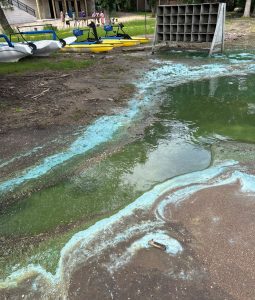(Des Moines, Iowa) – Official with Summit Carbon Solutions today (Monday) argued that the main components of two county ordinances in Iowa that sought to limit the placement of carbon dioxide pipelines are entirely overridden by the authority of state and federal regulators. According to the Iowa Capital Dispatch, the company reasserted those arguments in a recent brief in federal court — its response to the appeals by Shelby and Story counties of a judge’s rulings late last year that agreed with Summit. An injunction prevents the counties from enforcing the ordinances.
The filings of written arguments by both sides of the case set the stage for oral arguments before a panel of Eighth Circuit U.S. Court of Appeals judges. The oral arguments are not yet scheduled. The judges are expected to issue a decision sometime next year.

Summit seeks to build a 2,500-mile pipeline system in five states to transport captured carbon dioxide from ethanol producers to North Dakota, where the greenhouse gas would be pumped into the ground. It received preliminary approval in Iowa last month.
The work is incentivized by generous federal tax credits with the goal of slowing climate change. But many opponents of the project worry about the safety of people and animals near the pipeline that might be suffocated if it ruptures. The county ordinances create minimum separation distances — or setbacks — between the pipelines and populated places, such as cities, homes and livestock buildings.
The federal judge who ruled against the first county ordinances said, in part, they were so restrictive that they might make it impossible for a carbon dioxide pipeline to be built at all. A handful of ordinances that were adopted by other counties — most of which are also the target of pending lawsuits by Summit — were increasingly less restrictive. The most recent one was approved in April by Dickinson County, which has not been sued. Summit has declined to comment on the matter.
Chief Judge Stephanie Rose, of the federal Southern District of Iowa, said the Shelby and Story ordinances’ placement requirements are overruled by state regulators — the Iowa Utilities Commission — and that their safety-related provisions are the jurisdiction of federal regulators — the Pipeline and Hazardous Materials Safety Administration.
Rose went further and decided that the counties’ placement requirements are also a safety feature and are overridden by PHMSA, but the agency itself has contradicted the judge. However, Summit argues Rose was correct about the relationship of setbacks and safety, and its attorneys point to an early version of Story’s ordinance: “Story County started down this path solely out of concern for pipeline safety,” attorney Ryan Koopmans wrote in the recent appeal brief. “The county’s first ordinance, No. 306, focused only on setbacks because there are ‘risks in the event of a spill or rupture.’”
Summit further says county ordinance provisions that obviously pertain to safety — such as requirements to disclose certain information to local emergency officials to aid their potential response to a breach — is also PHMSA’s jurisdiction.As for determining the pipeline routes, Summit argues state law gives the Iowa Utilities Commission absolute authority: “It does not matter whether Summit or any other pipeline company could somehow thread the needle through the counties’ heavily restrictive setbacks, or whether the counties would grant variances and let the pipeline pass through anyway (and they clearly will not),” Koopmans wrote.
The American Petroleum Institute, which lobbies for the nation’s oil and natural gas industries, and the Liquid Energy Pipeline Association also recently filed a brief in support of Summit’s positions. They said pipelines are vital to the U.S. economy, are the safest way to transport energy products, and that the ordinances would have “far-reaching ramifications and unintended consequences.”
The ultimate effect of the court action on the pending lawsuits against other counties is not yet clear. They have been paused until the Shelby and Story appeals conclude. PHMSA is in the process of revamping its safety standards for carbon dioxide pipelines, and the counties have said the current rules are not adequate to protect the public. They argue that there is room for some measure of local control of the issue.










